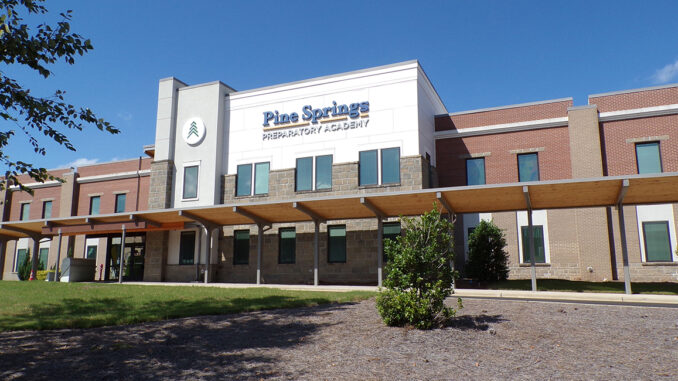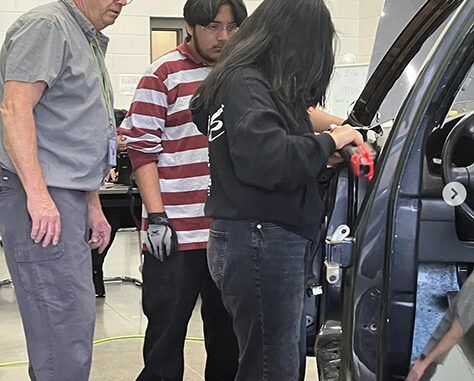
RALEIGH — Public charter schools in North Carolina have seen a boom in recent years, with the 2023 report to the General Assembly citing 145,075 students enrolled for the 2022-23 year.
That enrollment number represents more than 10% of the total state enrollment, according to the report. At the time of the report, 210 schools were in operation.
The report also found big waitlists, with 169 charter schools reporting having a waitlist at the start of the 2023-24 school year totaling 85,551 students, a number that could include duplicate names as students are often waitlisted at multiple charter schools.
For context, the overall waitlist total is larger than the 2023 enrollment of 70,126 in Guilford County Public Schools, one of the state’s largest districts.
Charter schools were established as public schools in North Carolina through the Charter School Act of 1996 (House Bill 955). There was initially a cap on the number of charter schools that could operate in the state. That cap was removed in 2011.
Similarly, a recent report issued by the National Alliance for Public Charters (NAPC) shows that from “2019-20 to 2023-24, charter school enrollment grew by 392,082 (+11.68%), while district enrollment has decreased by 1,750,607 (-3.89%).”
NACP found North Carolina charters had grown by more than 24% since 2019, while traditional district schools shrunk by 3.23% over the same time period. Additionally, minority enrollment in the state’s charter schools increased 23.83% for black students and 53.47% for Hispanic students. The report revealed that the increase in black student enrollment in the past five years was fueled by three states: Florida, North Carolina and Texas.
Between enrollment gains and large waitlists, demand is seemingly outstripping supply in the state’s public charter school system
Pine Springs Preparatory Academy in southern Wake County opened in 2017 and serves students in grades K-8 as well as a now-approved remote, fully virtual learning academy.
“From the very first year when we had just over 400 students, we still had it close to 1,000 students on a waiting list,” Pine Springs Head of School Bruce Friend told North State Journal of the school’s rapid growth and high demand.
Friend said Holly Springs, where the school is located, has seen a population explosion from 20,000 people 10 years ago to more than 50,000 in 2023. The growth has combined with increased interest in educational options and the desire to avoid school reassignments to boost applications at Pine Springs.
Charter schools, however, come with challenges, Friend said.
“I think the access to … land and/or facilities that can be converted into a school, coupled with the challenge of the financing all of that is what I think a lot of new charter school folks are finding is the real challenge,” said Friend, who is also the chair of the N.C. Charter Schools Review Board (CSRB).
The CSRB, established during the 2023 legislative session to replace the Charter Schools Advisory Board, oversees applications for new schools and renewing schools. The law also changed the authority for approval or denial of charter applications and charter renewal terms from the State Board of Education (SBE) to the CSRB.
The SBE fought this change and attempted to circumvent the CSRB’s authority by changing language in the board’s funding policies in September 2023. The SBE’s attempt was swiftly blocked in the 2023 state budget.
Turning to the recent issue with the legislature altering school funding to an arrears model, Friend observed that legislature’s changes “didn’t fund for the growth,” but instead relied on the previous year’s enrollment figures. That funding change, which has since been rectified by recent legislative action, put many charter schools in a financial bind.
“Maybe you’re looking at, again, maybe some upfront financing for the boards that are trying to get a charter started. We don’t have that in North Carolina like you see in other states,” Friend said about removing barriers to opening a charter school.
He also questions why charter schools don’t receive capital dollars like traditional public schools and suggests reconsidering the timeline for opening new schools after charter approval.
Friend said Pine Springs has acquired property and plans to open a biotech-focused high school tentatively set to open in 2026. Pine Springs has been working with Scott Ralls, president of Wake Tech Community College, about the possibility of helping Pine Springs students being able to graduate with a “bio work certificate.”
Like Pine Springs’ future biotech high school, Mecklenburg County’s Aspire Trade Charter High School offers students direct career pathways in various trade areas from automotive to culinary arts.

The school is a first-of-its-kind charter in the state and serves students in grades 9-12. Coursework includes the traditional core classes found in high school but elective courses that are all trade-related, as well as apprenticeships, are also offered.
“Their career path, this is not a little ‘we’ll take a few classes here and take a few classes there’ at a College Promise program. This is not that,” Aspire Trade’s Executive Director and Principal Jennifer Nichols told North State Journal. “These kids are basically getting what would be considered an associate’s degree.”
Like Pine Springs, Nichols said the funding in arrears model was requiring them to rethink their budget strategies as they are continually adding new students and there are still spaces open for the current year.
Additionally, like Pine Springs, Nichols said Aspire Trade did initially have a waitlist for their freshman class which has been cleared at the moment.
“We don’t have a wait list right now, but we anticipate that before we get too far into the school year, we’ll be wait listed again,” Nichols said.
Nichols, whose background is in education, said it was difficult getting the school up and running because there are no others like it, which led to starting with a footprint that could serve just over 500 students. Now, Aspire Trade needs to expand.
“The more people are finding out about this, the more people we’re getting coming to the school and saying, ‘Yes, we desperately need these,’” Nichols said.
Aspire Trade’s current offerings include automotive, carpentry, culinary, data science, HVAC, masonry/tile, medical assistant, medical coding, plumbing and welding/fabrication. Nichols said the school is also looking for a partner in the electrical field to add coursework in that area.
Aspire Trade Board Chair Derek Partee said an issue they are having is getting the word out about the school.
“When I speak to a lot of my peers, they’ve heard of Aspire Trade High School, but they have not been here to actually see the physical campus,” said Partee, a former member of the Board of Commissioners in Huntersville.
Nichols touted the ability of their students to graduate not just with a traditional high school diploma but also with certifications and licensure pathways, allowing them to enter their field right out of the gate.
“They will interview May of their senior year. They should have a position if they want one; doesn’t mean they can’t go on to college,” Nichols said.
“This is a very different program. It’s not like taking a few classes at the community college,” Nichols went on to say. “This is actually a very structured program that we hope will set them up both to be great employees; great workers.”
A number of the students at Aspire Trade are from low-income families in the Charlotte area, and many face transportation hurdles — not just in getting to school but after graduation.
Nichols added they were currently attempting to get cars donated or accept damaged cars that automotive students could repair for students to use when they graduate.
“One of our big fears was we’ve taken away the barriers, and then all of a sudden we come up to a graduating senior that has been given a great job offer within their career pathway and they’re so excited, and they have a way to get there,” Nichols said.
Nichols said the most important thing is encouraging students that trade jobs are an option.
“There shouldn’t be a stigma for kids who want to go into a CTE career opportunity because they are well-paid positions, No. 1 — I mean really well-paid positions,” said Nichols. “These career paths are not second tier; they’re not second class.”
Partee concurred, citing his own son had ADHD and “fell through the cracks” in New York schools.
“Aspire Trade High School offers another pathway for those students, and parents should be aware of that,” said Partee. “You know, parents who are really concerned about their child education, they should know that Aspire is here to provide that service.”
“I think that and the other message is that many of these students were not seen or not seen in those environments,” said Nichols. They weren’t the kid that was jumping up and down to answer the questions; they weren’t seen. Here, we see and we know our kids. They’re being seen for the first time. Their successes here are celebrated and these kids are seen and they start to explode with self-esteem and growth.”


